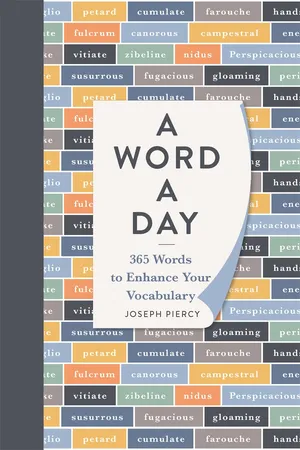
- English
- ePUB (mobile friendly)
- Available on iOS & Android
About this book
A Word a Day contains 365 carefully selected words that will enhance and expand your vocabulary, along with their meanings, origins and sample usage and fascinating word-related facts and trivia. It is estimated that on average an English-speaking adult has acquired a functioning vocabulary of 25, 000 words by the time they reach middle age. That sounds like a lot – and more than enough for the daily purposes of communicating with each other in speech and writing. However, it is hard to feel quite so sanguine about our word power when considering those 25, 000 words account for less than fifteen per cent of the total words in current usage in the English language. Furthermore, new words are created all the time and, as the word pool flourishes, can we afford to allow our vocabulary to stagnate?Logophile Joseph Piercy has the answer: a simple challenge to learn A Word a Day from this user-friendly onomasticon (that's a word list designed for a specific purpose – in case you were wondering …). Each of the 365 words have been carefully selected for their elegance and pertinence in everyday situations and every entry contains a clear and concise outline of meaning, origin and sample usage in context, alongside fascinating word related facts and trivia. A Word a Day is a treasure trove of fascination and fun for all language lovers – delve in and enhance your vocabulary.
Frequently asked questions
- Essential is ideal for learners and professionals who enjoy exploring a wide range of subjects. Access the Essential Library with 800,000+ trusted titles and best-sellers across business, personal growth, and the humanities. Includes unlimited reading time and Standard Read Aloud voice.
- Complete: Perfect for advanced learners and researchers needing full, unrestricted access. Unlock 1.4M+ books across hundreds of subjects, including academic and specialized titles. The Complete Plan also includes advanced features like Premium Read Aloud and Research Assistant.
Please note we cannot support devices running on iOS 13 and Android 7 or earlier. Learn more about using the app.
Information

Whom I will trust as I will adders fanged,
They bear the mandate; they must sweep my way
And marshal me to knavery. Let it work;
For ’tis the sport to have the enginer
Hoist with his own petard; and ’t shall go hard
But I will delve one yard below their mines
And blow them at the moon. O, ’tis most sweet
When in one line two crafts directly meet.



Table of contents
- Cover
- Also by Joseph Piercy
- Title Page
- Copyright
- Contents
- Introduction: The Problem with Definitions
- 1 Imbroglio
- 178 Repine
- Index